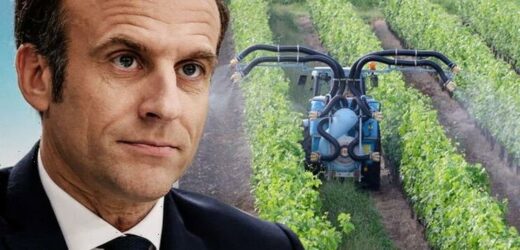Ukraine: Expert warns ‘food is running out’ in Mariupol
We use your sign-up to provide content in ways you’ve consented to and to improve our understanding of you. This may include adverts from us and 3rd parties based on our understanding. You can unsubscribe at any time. More info
In a letter sent to France last week, the Commission slammed the French government for failing to meet environmental standards set by the new Common Agricultural Policy (CAP). The CAP is an EU agricultural policy that implements a number of agricultural subsidy systems, along with other programmes- with the aim of increasing agricultural productivity and raising a fair standard of living for EU farmers.
However, the policy is frequently criticised by a number of parties on its costs, impacts on small scale farmers, and for failing to meet development targets.
Last week, the EU Commission sent observation letters analysing the plans of the 19 member states who submitted their agricultural plans on time.
This letter focussed on the strengths and weaknesses in each nation’s plan, along with suggesting areas for improvement.
According to the Commission, France, along with the rest of the EU countries need to “strengthen the resilience of the agricultural sector”, “reduce its dependence on synthetic fertilisers”, and “increase the production of renewable energy”.


This comes as Russia’s invasion of Ukraine sent global food prices to an all time high, according to UN agencies.
In the letter, the EU Commission slammed Macron for the lack of ambition in their agricultural plan, saying that the country’s National Strategic Plan (NSP) “only partially supports the ecological transition of the agricultural and forestry sectors”.
It added that France needs to “transform its production capacity by promoting more sustainable production methods”.
The letter criticised Macron’s government for taking “no significant measures to improve animal welfare, in particular, to encourage the rearing of pigs without tail docking and unconfined rearing systems for laying hens, calves and sows”.

The Commission looked at France’s plans on water protection and said that the country is “invited to review the level of support for water protection and fertiliser management objectives upwards” to contribute effectively to the objectives of the Water Framework Directive (WFD).
Macron has also been advised to “differentiate the levels of remuneration” and propose a “third level of payment to reward farmers for adopting the most virtuous practices”.
Even in the UK, Russia’s invasion is beginning to affect food prices, with the price of milk set to rise 50 percent, while a pack of butter will jump by a quarter.
DON’T MISS:
UK makes another ‘stunning’ nuclear fusion breakthrough: World-first’ [REVEAL]
Putin’s plot to hold Germany to ransom could end in disaster [INSIGHT]
Energy crisis: UK unveils ‘urgent’ £375m energy package to slash bills [REPORT]


Sunflower oil – and products containing it, like crisps – alongside staples such as bread and potatoes are all likely to become dearer as a result of the crisis in Ukraine.
Minette Batters, president of the NFU, said: “Farmers are experiencing unprecedented costs when buying fertiliser, alongside tightening supplies, and it’s critical that government put in place measures to mitigate some of these effects.
“We are seeing wheat prices going to places we have never seen before. Ukraine and Russia are massive exporters of wheat.”
Source: Read Full Article


